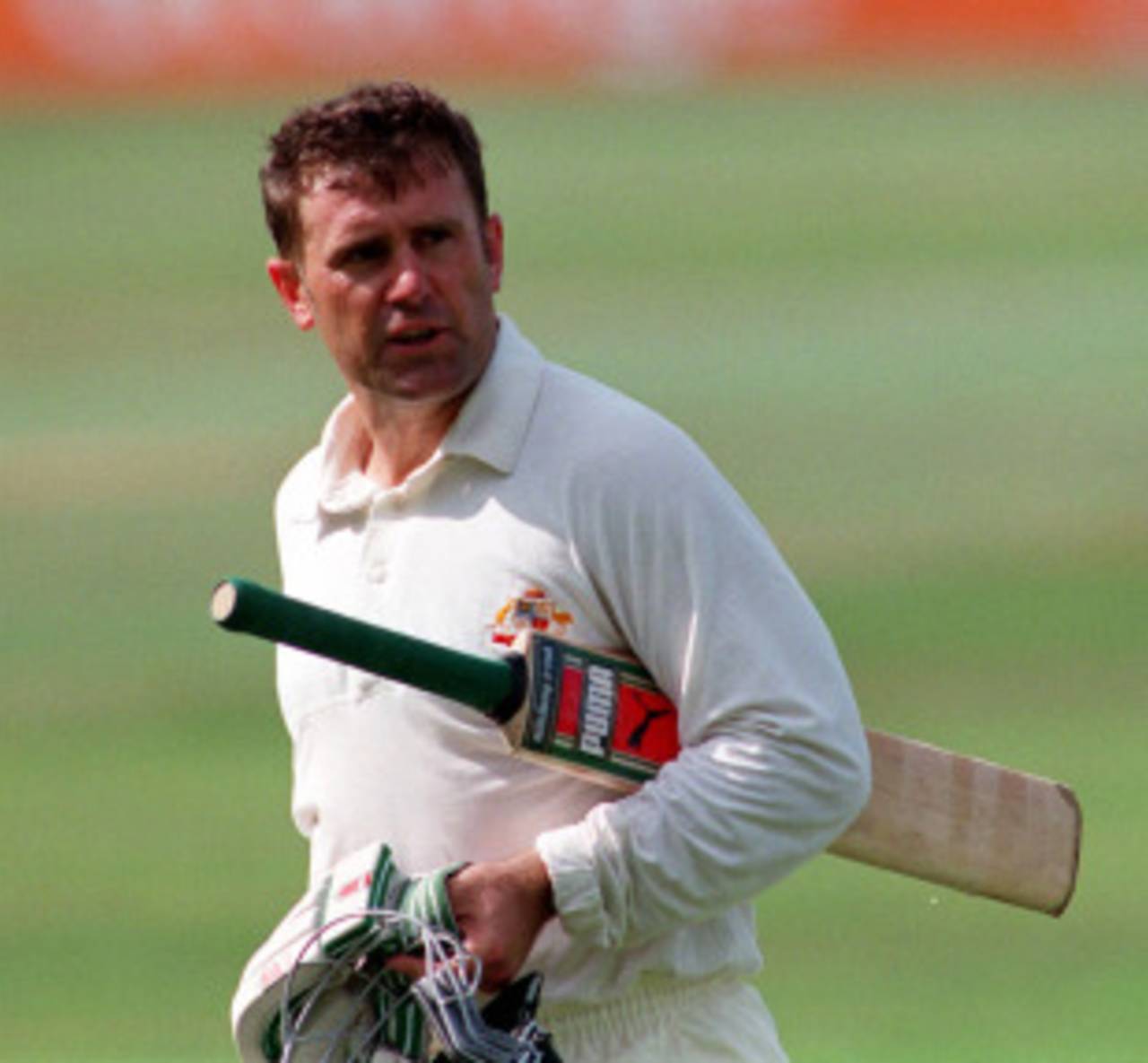The stolid buccaneer
As batsman, Taylor was safe as houses; as captain, he was an adventurer
Sharda Ugra
Oct 17, 2010, 2:11 AM

Mark Taylor: no dramas, mate • PA Photos
Grace, flourish and a love of fireworks were the reasons Kim Hughes was my chosen one. He batted beautifully and behaved impeccably - even when beaten, which used to happen rather a lot with Australia then. So what if he was the subject of public meltdown when he quit the captaincy mid-series? Clearly this was also a very sensitive guy - even better. But then Hughes really blew it, agreeing to lead a rebel tour to South Africa. Nelson Mandela was still in jail then and we Indians took rebel tours very personally.
With Hughes gone, you couldn't turn to the Indian team and pick a favourite from among them because it was always all of them - together in the breach. As long as they just won, anyone could play hero. You would gladly line up and worship.
Exactly when Mark Taylor broke into this personal citadel of flamboyance and nationalism is tough to tell. But he's there - entrenched, like at the crease, probably chewing gum, like at slip. He wasn't stylish nor was he Indian. So how did he slip past the guards?
One season at a time, the unobtrusive way. Clearly more than the sum of his runs or the manner of his run-making, Taylor was a cricketer who could be both old-fashioned and new-fangled, belong to yesterday as much as tomorrow. A Test opener from an ancient mould, his vision and instinct came from a sharp, shiny toolbox. Taylor the batsman was a creature of unrelenting reliability, a frontman who did the dirty work so that the sons of Errol Flynn who followed had something to showboat on. Taylor the captain was an adventurous frontiersman who would have given Flynn a headache from keeping up with the twists and turns he engineered in the plot of a day's play. It was an intriguing combination, like discovering that the insurance agent next door is also world limbo-dancing champion.
Today's Aussies, skilled in the art of Waugh, and even Sun Tzu, preach to us the modern gospel of victory built on their pursuit of 300 runs a day, but it was an idea patented in the Taylor era. If Border stopped Australia from losing, Taylor taught them how to win. There was none of the trendy rubbish about mental disintegration either - Taylor never had a problem reining in his team, which included some who went on to become the Inflammables. Yet no one mistook his civility for weakness. Taylor's toughness was not a string of profanities but a state of mind. Off a cricket field, it's not a bad way to be either.
Before India was nominated the Final Frontier, there was only one forbidden kingdom - the West Indies. It was Taylor who led the first raiding party in 1995. He was minus his two opening bowlers, Craig McDermott and Damien Fleming, but orchestrated West Indies' first home series defeat in 22 years through the wicket-taking of Shane Warne, Glenn McGrath, (until then only a raw first-change), Paul Reiffel and Brendon Julian. The sheer daring of it.
In a business dominated by large, fragile egos and feet of clay, Taylor was Everyman. He didn't preen, gloat or, praise the Lord, sermonise, and even responded to the nickname Tubby. He was a very square left-hander with a huge appetite for runs and, evidently, good dinners. A decent, ordinary fellow but, and that was the magic, someone who made the extraordinary happen. Not so common after all.
In the 18 months and 21 innings between 1995 and 1997 that he didn't score a Test fifty, Taylor didn't miss a trick on the field. He won every series in that time, other than the one-off Test in New Delhi. Arriving in England for the 1997 Ashes tour, he was greeted by Heathrow immigration: "Mark Taylor, the captain... ah, but for how long?" An English tabloid wanted him to pose with a bat that was a metre wide. He refused. Yet he turned up match after match, to answer the inevitable questions about his form. Of course he was only being polite (an entry in his captain's diary of the time went, "Have to face the press now. Time to put on my smiley face again.") but did such a good job of it that after his final press conference of the tour, one reporter stood up and made a formal speech in appreciation of Taylor's conduct.
The trademark Taylor move of that series - a favourite piece of quiet heroism - came in the third Test. Down 0-1, still rusty despite a first-Test hundred, Taylor won the toss and had to choose: should he go with conventional wisdom, put England in on a damp Old Trafford wicket, and as opener give himself the chance to bat when conditions were better? Or should he face the unfriendly and unpleasant in order to give Shane Warne a chance to hustle England in the fourth innings? Taylor picked the tougher option and scored 2 and 1. But Australia won that Test and the next two and retained the Ashes. The captain struggled on, making only one fifty in the series after that.
So when he declared on 334 in Peshawar, eager to pursue any chance of his team's victory, and content to sit alongside Don Bradman rather than chase Brian Lara, it wasn't a moment of revelation or the great big exclamation point. It was reaffirmation, QED, full stop. Taylor, cricketer and captain, was always an honourable man. He wasn't named Mark Anthony for nothing.
Sharda Ugra is senior editor at Cricinfo. This article was first published in Wisden Asia Cricket magazine in 2003